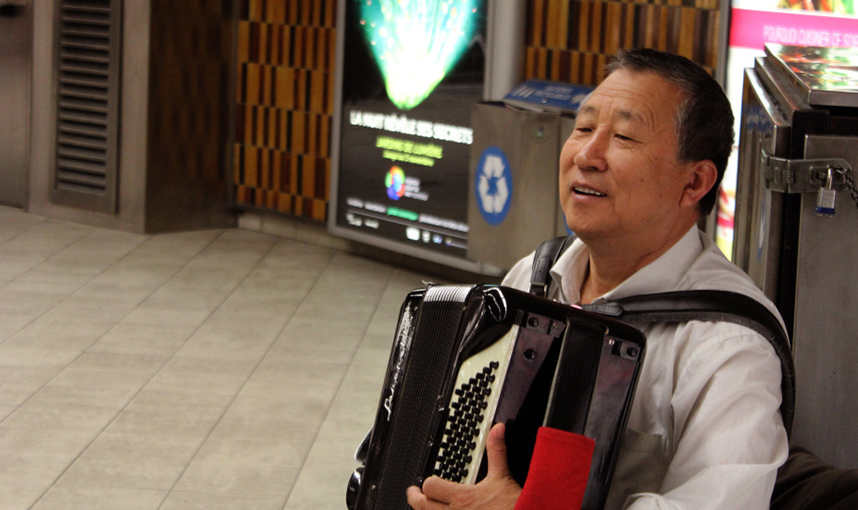Les Étoiles du Métro allows buskers to reserve their spot at designated metro performing areas

Musicians would wake up at the crack of dawn to sign their name on the list of daily metro performers, hoping that there was a spot left to begin with; it’s a first come, first served system. This was the reality of street performers a few years ago, before the STM and MusiMetroMontréal joined up to create the Les Étoiles du Métro program.
Since 2012, participants can schedule online ahead of time to perform at locations in five different metro stations: Berri-UQAM, Place-des-Arts, Jean-Talon, Villa-Maria, and McGill.
Busking has become an organized, not to mention audition-based, activity in the Montreal underground.
However, this program was not unanimously approved at first. “It kind of goes against the philosophy of busking,” said Andrew Blakney, who plays the washboard in the band Old Time Honey. “To say that there’s going to be a group of people deciding who can and cannot busk, or who’s better or worse.” On the other hand, he has noticed that the quality of the acts has gone up in the main stations as a result of the program.
His group experienced positive outcomes from playing in the metro. A jug band is a band that employs the use of homemade instruments, and uses an empty jug for a low bass sound. Jug band, Old Time Honey, formed during the first year of the program. The group got a lot of attention by busking during a performance at Place-des-Arts metro, which led to a series of high profile contracts. They got hired for La Fête Nationale, were invited to Belle et Bum—a francophone television program focused on music—and their music even played on ICI Radio-Canada Première, 95.1 FM.
While some artists use the program as a stepping-stone to get greater attention, others busk as a main occupation. Busker, Philippe Arpin, has dreamt of making a living off of music ever since he started playing. Busking has been his only source of income for five years now. He joined Les Étoiles du Métro to keep performing at his favourite spots: Berri-UQAM and Place-des-Arts.
Arpin, who plays either the guitar or the banjo in a small boat with a fishing rod, masters a vast range of musical genres—from Ragtime, to Flamenco, Irish, Blues and Folk. One of his objectives is to make enough money to practice more at home. “It’s hard work and I’d love to deliver even more, to renew my repertoire more often … I am in this circle where it’s not the most profitable thing, but again, who makes a lot of money aside from [those] playing pop music?” Arpin asked.
Nevertheless, Arpin enjoys his job. “It makes me feel good, the metro makes me feel good, precisely because it’s rare that I’m going to play in places where people do not react to my music. It’s give and take,” he said.
Busking can also be about sharing. Pierre-Olivier Bolduc, a newcomer in the program, plays a rare instrument called the innersound. He says it is often compared to a spacecraft, but it’s actually part of the handpans family; a metal instrument played with the musician’s fingertips.
Bolduc joined the program to benefit from the scheduling system and better locations, and has since found his time invested in busking more profitable than ever before. Besides, Bolduc considers sharing his instrument as a sort of mission, and so reaching out to a massive amount of metro users contributes to achieving that goal.
“It’s nice to see so many curious people, and to see so many people who react to the sound of my instrument too,” said Bolduc. This is a curiosity that Blakney, Arpin and Bolduc have all experienced firsthand while performing as part of Les Étoiles du Métro.



